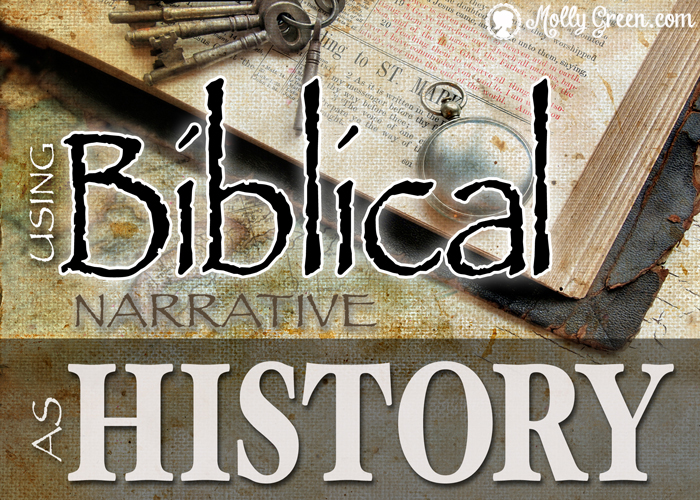By Mckenzi Knapp
In my formal article, “Homeschooling’s First Love”(published in the Sept/Oct edition of Molly Green Magazine), we explored the necessity of making the Bible the centerpiece of our children’s education. In this post we will discover some of the ways we can incorporate Scripture in everyday learning. Before we delve into the practical means however, we must consider how we are to teach the Bible.
In keeping with contemporary thought, the Bible is often reduced to little more than a book of inspirational peps, wise sayings, or a self-help guide. Our reverence for God’s Holy Word has been so shredded by the assaults of humanism that we hardly know why God gave us His Word to begin with. So let’s take a few minutes to look at, not only what the Bible offers educationally, but the very manner in which we are to teach it.
Of all the methods God could have used to reveal His plan and working with mankind, He chose history. Just cast a glance at the sixty-six books of the Bible: forty are all historical accounts (forty-one if you count Revelation, which is a foretelling of history to come). This is phenomenal! Stop and consider God’s emphasis on the importance of history. God revealed His Person, Man’s purpose, sin, salvation, loss, and final victory through the lives of real men and women, kings and kingdoms—through history.
For too long the Bible has been treated like Sunday’s delicate china when God intended it to be an all-purpose tool that never sits idle. It is supposed to go down in the dirt with the archaeologist’s shovel, bear the splatters from science experiments like soup on a recipe book, and have its gilded pages dulled and crinkled from the eager fingers of children. If we truly believe the Bible is 100 percent accurate on all topics at all times, we will take its historical claims even more serious than we do the Encyclopedia.
To view the Bible as anything less than God’s perfect historical account of the rise and fall of nations is to ignore one of the main purposes for which God gave us the Scriptures. Need we wonder why history is so neglected and despised by today’s academic elites? Atheists hate history because God’s fingerprints are all over it. But we must walk a different path. We must not hide these things from our children. We must tell the generations to come of God’s works of old, and we begin with honoring His Word as the truthful and unshakable record that it is. This is one historical record that evil men have not been able to corrupt, taint, or destroy. This is one record that can equip our children spiritually, intellectually, and yes, educationally.
Transforming our view of the Bible deserves much more discussion that exceeds the bounds of this post. For now, let’s turn our gaze to the practical side of the question. What are some tangible ways we can restore the Bible (and especially Biblical history) as the hub of our children’s education? Below are some passages you can begin using with your children today that correspond to historical events. This is by no means a complete list. Rather see this as a springboard for your own study into the greatest history textbook of all … well … history!
The Global Flood
Genesis 6–9
One of history’s major turning points. (Hint: if you don’t understand the implications of the Flood, you are not going to understand history.)
The Table of Nations
Genesis 10
Traces all the major people groups as they developed into nations.
The Hittite Nation
Genesis 23
Abraham bought the burial place for Sarah from the Hittites (the children of Heth).
Exodus 3
God promises Moses that He will give the land of the Hittites to Israel.
Deuteronomy 7
The Lord commands Israel to destroy seven nations that were greater than they, among which were the Hittites.
Joshua 12
Describes part of the Hittites’ territory and records some of Israel’s battles with them.
The Babylon Empire
2 Kings 20
Isaiah’s prophecy to King Hezekiah foretelling the Babylonian exile.
2 Kings 24 & 25, 2 Chronicles 36
Nebuchadnezzar’s conquests.
Isaiah 13, 14, 21, 39
Prophecies made regarding Babylon.
The Book of Daniel
Detailed accounts of the reigns of Nebuchadnezzar and Belshazzar, as well as the fall of Babylon.
The Assyrian Empire
Genesis 10:11
Nimrod built Nineveh, the capitol of Assyria.
2 Kings 16–19, 2 Chronicles 32 and Isaiah 36
Assyria’s relationship with both the nations of Judah and Israel.
The Book of Jonah
Jonah was sent as the reluctant preacher to Assyria’s capitol city, Nineveh.
The Book of Nahum
Prophecies against Nineveh.
The Persian Empire
The Book of Ezra
Records Cyrus’ decree to the Jews.
The Book of Esther
King Xerxes (Ahasuerus) of Persia was Queen Esther’s husband.
Daniel 5–6
Recounts the conquests of the Persian Empire over Babylon.
The Roman Empire
Matthew 24
Jesus’s prophecy foretelling the fall of Jerusalem to the Romans.
Luke 2
Records Caesar Augustus’s decree of a world tax.
Acts 25 and 27:24
Nero was the Caesar before whom Paul stood trial.
To read the article that prompted the editors to ask Mckenzi for this follow up blog post, click here to buy the Sept/Oct issue of Molly Green Magazine:
There is no more beautiful way to live than on a small homestead nestled in the gorgeous Missouri Ozarks, and Mckenzi, with her wonderful family of nine, feels very blessed to call such a life hers! Along with enjoying the bounty of the homestead, Mckenzi also loves writing, reading, studying history, and operating her own small businesses.





